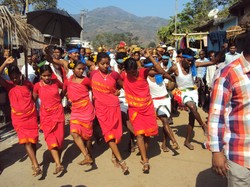During his recent visit to farming communities across India, Presbyterian Hunger Program (PHP) Associate Andrew Kang Bartlett asked farmers what their biggest struggle was, and all agreed it was agribusiness. Large multinational corporations have come to India with hybrid seeds and new technology to “empower farmers and produce more from their land.”
But the various farming communities aren’t buying it. Many claim the new technology and seeds are too expensive and are impacting the health of their people. The farmers want to grow crops using their own seeds and farming methods and hope to pass these on to future generations.
The costs of using the new seeds and chemicals have driven thousands of farmers out of business, leaving some desperate enough to take their own lives, according to Kang Bartlett.
“In Mumbai, I’ve heard that 250,000 farmers flood into this city of 21 million each year, looking for a new way of life,” he says. “It’s a day-to-day struggle for many to make a living and to fight their way out of poverty.”
During his eight-week visit, Kang Bartlett met with PHP’s Joining Hands partner, Chethana, for its annual gathering. Chethana is a network of grassroots organizations in South India working against the causes of hunger and poverty. The goal is to help Dalits, women, artisans, small and marginal farmers, and minorities take control of their own communities and livelihoods so they can freely choose to resist the influence and control of outside companies.
“These groups come together because they find value in learning from others with very differentbackgrounds and experiences,” says Kang Bartlett. “One focus is on seed saving and building networks with other seed savers, but it is also about joint advocacy efforts to strengthen their agro-ecological approaches.”
Kang Bartlett and Valery Nodem, coordinator of Presbyterian Hunger Program’s Joining Hands, heard from a number of farmers who are transitioning their rice and wheat crops from chemical-based to organic production. Others are helping farmers market their products and trade or sell the traditional seeds they are reviving.
“With all of the increased challenges from agribusiness, the rural citizens and farmers have come to the realization that they need each other,” adds Kang Bartlett. “Networking becomes a necessity if they are going to save their lands and maintain their livelihood.
Another challenge Kang Bartlett witnessed on his visit was the struggle over land. He said a new ruling party in India is trying to strike parts of the existing land acquisition act, which would basically take away the farmers’ rights on what to do with their own land. Farmers fear this would allow the government to pass private land to businesses and large-scale plantation owners.
India’s proximity to the equator provides another problem for farmers.
“The increase in global temperatures is already having an effect,” Kang Bartlett says. “For every one-degree-Celsius increase above the norm, farmers lose about 10 percent of their grain production. The amount of grain India needs to produce is huge, and this will be increasingly compromised by a warming planet.”
Kang Bartlett says studies show that organic approaches to farming produce the best crops in India’s climate. That runs counter to the direction agribusiness is headed. Organizations like the Presbyterian Hunger Program, Chethana, and others continue to work with farming groups and communities to maintain their traditional farming techniques bolstered by new innovations and to improve their sustainability.
“The Presbyterian Hunger Program can help Presbyterians understand how US policies can help or hurt farmers’ ability to protect their seeds, land, and communities,” he says. “And Presbyterians can make a difference by weighing in on trade and farm policies by contacting their congressional representatives through the PC(USA) Office for Public Witness.”
For more information on Kang Bartlett’s trip, go to: http://www.pcusa.org/blogs/foodfaith/2015/4/13/india.

